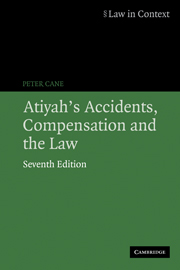Book contents
- Frontmatter
- Contents
- Preface
- List of abbreviations
- List of tables
- Table of legislation
- Table of cases
- Part One The Issues in Perspective
- Part Two The Tort System in Theory
- Part Three The Tort System in Operation
- Part Four Other Compensation Systems
- 11 First-party insurance
- 12 Compensation for criminal injuries
- 13 The social security system
- 14 Other forms of assistance
- Part Five The Overall Picture
- Part Six The Future
- Index
11 - First-party insurance
Published online by Cambridge University Press: 05 June 2012
- Frontmatter
- Contents
- Preface
- List of abbreviations
- List of tables
- Table of legislation
- Table of cases
- Part One The Issues in Perspective
- Part Two The Tort System in Theory
- Part Three The Tort System in Operation
- Part Four Other Compensation Systems
- 11 First-party insurance
- 12 Compensation for criminal injuries
- 13 The social security system
- 14 Other forms of assistance
- Part Five The Overall Picture
- Part Six The Future
- Index
Summary
Types of first-party insurance
Under a ‘third-party’ or ‘liability’ insurance policy one person (the ‘first party’ we might say) is insured by the insurer (the ‘second party’) against the risk of being held legally liable to another (the ‘third party’). Under a ‘first-party’ or ‘loss’ insurance policy the policy holder (the first party) is insured against the risk of suffering loss specified in the policy by causes defined therein. Nearly all accident risks can be covered by first-party insurance of one kind or another. Life insurance, which usually covers death from any cause except (in some cases) sane suicide, is by far the most common form of first-party insurance against risks to the person (i.e. death from personal injury and other causes). In 1996–7, 61% of UK households were paying for some life insurance. A significant proportion of life insurance is mortgage-related – that is, it provides security against the death of the mortgagor. Total UK premium income in 1997 for life insurance was about £28 billion. The popularity of life insurance is partly attributable to the fact that it is used as a form of investment, not merely as a protection against risks; but also partly to the fact that premiums for this type of insurance are low relative to the benefits provided.
- Type
- Chapter
- Information
- Atiyah's Accidents, Compensation and the Law , pp. 291 - 299Publisher: Cambridge University PressPrint publication year: 2006



